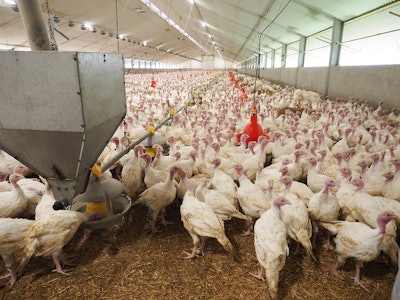
Adding tryptophan to poultry diets can improve performance and welfare.
“There have been quite a few trials indicating that tryptophan improves feed efficiency and growth, but more recently, tryptophan has been shown in layers, broilers and even some turkey papers to improve welfare or coping ability to stress,” Chantel Pennicott, program technician, University of Arkansas System Division of Agriculture, said.
“I think it’s an untapped welfare tool,” added Shawna Weimer, Ph.D., director, the Center for Food Animal Well-Being, a part of the University of Arkansas System Division of Agriculture.
For example, research has revealed that tryptophan supplementation towards the end of the growing or laying period can reduce bird stress during handling and transport. Both of these activities are associated with higher stress in broilers,
Improving welfare during this period can lead to a lower number of birds that are dead on arrival or injured and improved meat quality.
Connecting poultry gut health, welfare
Tryptophan, an essential amino acid, cannot be synthesized by the body, which make supplementation important.
The amino acid serves as a precursor for serotonin and melatonin. These neuroendocrine messengers play a major role in reducing stress-related behaviors, such as feather pecking in laying hens, as well as poultry gut health.
“With the drive away from antibiotic use, gut health has been really important and a huge focus of nutritionists. Tryptophan can really help with that gap,” Weimer explained.
In poultry, the majority of serotonin is produced in the gut. Animals under stress produce less serotonin, which impacts gut function and can lead to leaky gut and other diseases.
“There’s also the hypothalamic–pituitary–adrenal (HPA) axis, where there’s a hormone neurotransmitter interaction,” Pennicott said.
There’s still a lot to learn about the HPA axis in poultry, she noted, explaining that when an animal is under stress, there is corticosteroid produced and that downregulates serotonin production. This can lead to sickness in poultry.
“There’s a lot of untapped opportunities with feeding tryptophan because of that gut-blood-brain barrier,” Pennicott added.
To learn more about poultry welfare, register for free for the Third Annual Poultry Extension Collaborative Symposium, scheduled for May 16.


















